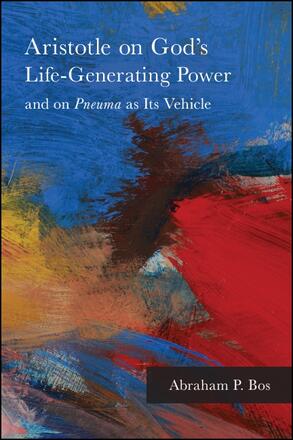
Aristotle on God's Life-Generating Power and on Pneuma as Its Vehicle
Alternative formats available from:
Proposes an innovative rethinking of Aristotle’s work as a system that integrates his theology with his doctrine of reproduction and life.
Description
In this deep rethinking of Aristotle's work, Abraham P. Bos argues that scholarship on Aristotle's philosophy has erred since antiquity in denying the connection between his theology and his doctrine of reproduction and life in the earthly sphere. Beginning with an analysis of God's role in the Aristotelian system, Bos explores how this relates to other elements of his philosophy, especially to his theory of reproduction. The argument he develops is that in talking about the cosmos, Aristotle rejected Plato's metaphor of artisanal production by a divine Demiurge in favor of a biotic metaphor based on the transmission of life in reproduction, in which pneuma—not breath as it is often interpreted but the life-bearing spirit in animals and plants—plays a key and sustaining role as the vital principle in all that lives. In making this case, he defends the authenticity of the treatises De Mundo and De Spiritu as Aristotle's, and demonstrates Aristotle's works as a unified system that sharply and comprehensively refutes Plato's, and in particular replaces Plato's doctrine of the soul with a theory in which the soul is clearly distinguished from the intellect.
Abraham P. Bos is Professor Emeritus of Ancient and Patristic Philosophy at the Vrije Universiteit Amsterdam, the Netherlands. His books include Aristotle, On the Life-Bearing Spirit (De Spiritu): A Discussion with Plato and His Predecessors on Pneuma as the Instrumental Body of the Soul; The Soul and Its Instrumental Body: A Reinterpretation of Aristotle's Philosophy of Living Nature; and Cosmic and Meta-cosmic Theology in Aristotle's Lost Dialogues.
Reviews
"A must-read for any student and scholar interested in Aristotle's view of pneuma. In short, this book is a masterpiece, distilling many years of research of a great Aristotelian scholar." — Review of Metaphysics
"[Bos's] knowledge of the Aristotelian corpus is impressive … the book deserves to be taken seriously as a valuable contribution to Aristotelian scholarship." — Philosophia Reformata
"Bos offers a fresh, interesting, and important perspective. His interpretation will be very controversial, but if he is right, the standard Anglo-American interpretation of Aristotle will have to change radically." — Malcolm Wilson, author of Structure and Method in Aristotle's Meteorologica: A More Disorderly Nature